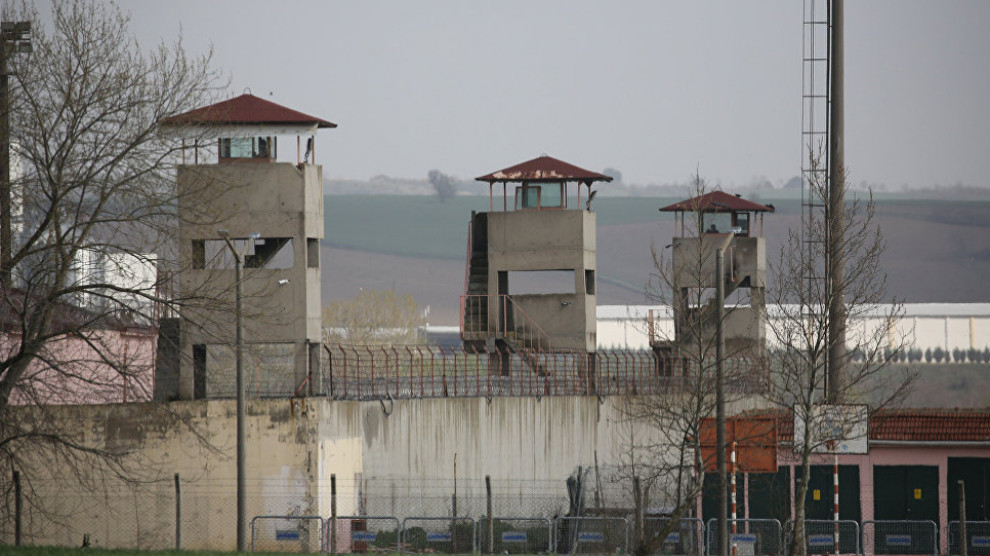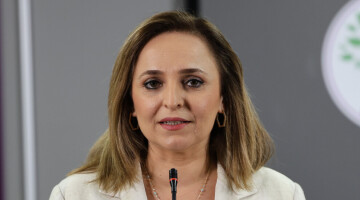The Monitoring Committee, which was established to monitor isolation and hunger strikes, submitted a report to the Ministry of Justice.
The report noted that the situation has gone beyond the critical threshold and that isolation should be lifted immediately.
The Human Rights Association (IHD), the Human Rights Foundation of Turkey (TIHV), Lawyers Association for Freedom (EMV), Contemporary Jurists Association (CHD) have created the Monitoring Committee to follow the situation of hunger strikers in prison demanding the end of isolation against Abdullah Öcalan.
The Committee prepared a report called "Ongoing Hunger strike in Turkish Prison Observation and Assessment Report" and presented it to the Ministry of Justice.
From the Report
The report recalled that on 8 November 2018, DTK co-chair and HDP Hakkari MP Leyla Güven went on hunger strike demanding the end of isolation.
Reminding that on Güven’s 182th day of hunger strike, there are about 3000 prisoners on hunger strike in 92 prisons.
The report underlined that politicians Sebahat Tuncel and Selma Irmak went on hunger strike on 15 January in prison, while HDP deputies Dersim Dağ went on hunger strike on 3 March and deputies Tayip Temel and Murat Sarısaç on 8 March.
The report also reminded the 8 prisoners and activists who ended their life to protest isolation: “Uğur Şakar, Zülküf Gezen, Ayten Beçet, Zehra Sağlam, Medya Cinar, Yonca Fluent, Siraç Yüksek, Masum Pamay.”
The stage reached by the hunger strikes, said the report, is serious and the organisations stressed the “need to enter the prisons with independent delegations and doctors. We invite the political power - said the report - to be responsible and to remove the isolation in prisons."
Many serious health problems registered in prison
The report also noted that many prisoners suffered from many health problems, including: "Weight loss, weakness, difficulty in walking, ulcers in the mouth and throat, constipation, diarrhoea, inability to sleep, blur in vision, headache, problems with exposure to light, sensitivity to smell and sound, twitch in the body muscles, heartburn, mouth inflammation, gingivitis, itching, hazy vision, concentration and attention problems, balance issues, yellowing in the pupils, darkening in the color of urine, burning when urinating, hand and feet numbness..."
The report also listed several other problems such as bans in receiving letters and papers, disciplinary punishments, carbonate not supplied to prisoners in 8 jails, among others.
Observations
The report also included the following observations about prisoners on hunger strike:
In many prisons, the hunger strikers are not monitored by doctors; it was understood that they were forced to go to the infirmary alone.
The prisoners on hunger strike are well beyond the critical threshold and are suffering from heavy health problems. Health checks should be carried out in the room or in the ward themselves. In many prisons hunger strikers are actually helped by fellow inmates and comrades in their daily needs.
In many prisons no blood and temperature are checked and this is a problem in a situation where those should be constantly monitored.
While the health status of the hunger strikers should be monitored on a daily basis, in many prisons, these checks were carried out rarely and especially during the weekend they were not carried out.
Vitamins needed by the hunger strikers are also not provided in many prisons or are provided at times.
Those on hunger strike who have been talking about their resistance either with lawyers, families or the press are constantly subjected to punishment. Their phone conversation with family members is regularly cut off and hunger strikers are harassed by prison guards.
These problems, underlined the report, should be urgently resolved and the principles of medical care should be complied with in order to guarantee the health of prisoners on hunger strikes.
In addition, it is necessary to warn the prison authorities when guilty of practices contrary to the legislation and to open the necessary judicial and administrative investigations.













